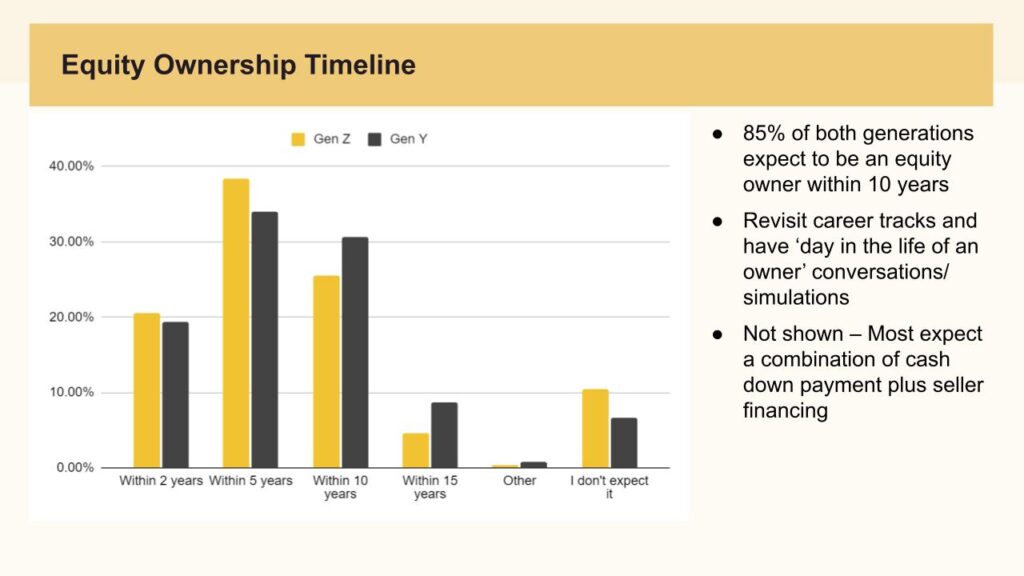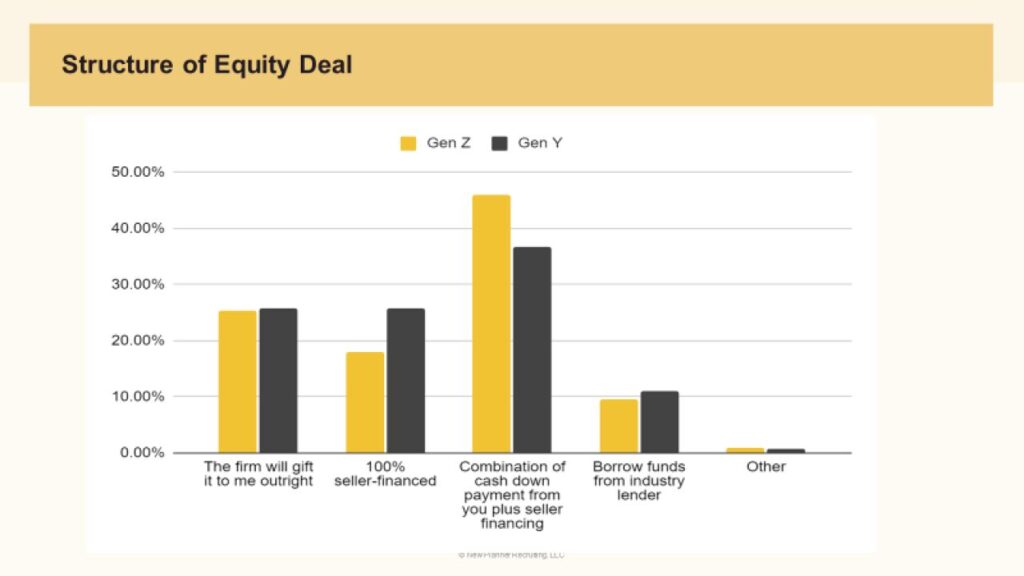Last month in part four of our research survey series, we looked at how new planners felt about their compensation, and what increase would be required for them to feel fairly compensated.
This month, in our final installment of the 2024 Career Satisfaction survey series, we look at how next-generation planners view equity ownership, whether they seek it, when along the career path they expect it, and how they expect to acquire it.
Equity Ownership Desire and Timelines
One of the unique advantages of the independent RIA channel is the ability to offer employees equity in the business itself. In fact, this is one of the primary reasons why the independent RIA channel is highly sought after by talent employed in other channels. In our recruiting firm, we field inquiries every week from people seeking to leave their current channel (bank, brokerage, wirehouse, etc.) where they can’t be true owners of the firm and want to find a new firm where they can be. Not everyone seeks ownership, nor is wired to be an owner, but it is still a powerful recruiting and retention tool if positioned and used properly.
Based on our research results, 85% of both Generation X and Y expect to be an equity owner within 10 years of starting their careers. Understandably, not every firm wants to offer ownership, but this certainly puts them at a disadvantage from a recruiting and retention perspective, at least with these two generations.

We did find it interesting - and quite comical - that ~20% of both generations expected ownership after two years! We appreciate the self-confidence, but that isn't what we see in terms of timelines typically; 5-7 or even 10 years is more common.
Nonetheless, this is why we encourage firms who do offer ownership to talk about it during the recruiting and hiring process, and continually revisit when reviewing team member ongoing growth and performance. Be sure to reiterate it is available to them, review the parameters of achieving, and measure where they may be falling short, both to set expectations of what is realistic to expect in your firm, and so they’re clear on what needs to be done to achieve it. Each firm will have to develop their own metrics for someone to become eligible to be an owner. And sometimes there might not even be metrics, only that the individual’s contributions have been critical for the firm’s growth and success. But those are still expectations that can be communicated, which brings clarity for the candidate, and ideally motivates them to action by clearly showing them what they need to do to be successful in becoming an equity partner.
At the same time, it is worth noting that not everyone is seeking nor expects equity ownership.
When it comes to how new equity owners actually become equity owners - i.e., the structure of an equity deal - it was surprising to us that ~25% of both generations expected their employers to outright ‘gift’ them equity in exchange for the services they have already provided to the firm. In practice, though, what we see most commonly is either a 100% seller-financed structure, where new partners pay the loan back to the existing owner(s) via profit distributions, or some combination of cash down payment plus seller financing.

It is more reassuring perhaps that the majority of both generations expect to put down some cash. Depending on the valuation of your business, your next generation of owners may not be able to make a down payment to buy the whole practice at once, due to insufficient personal assets. But they can often still make some downpayment to buy a smaller tranche as an initial equity stake. And expecting them to do so both reduces your risk, and can be more motivating when they have “skin in the game.” Furthermore, there are specialty lenders such as LiveOak Bank, that can further finance a potential down payment.
Equity Compensation Takeaways
Equity ownership potential can be a crucial part of your recruiting strategy for attracting talent to your organization. It is to be handled with care and clarity to ensure you and your G2 or G3 owners are all on the same page. Understandably, the right future leaders will understand your struggles and challenges over the years in building your business, and should not take lightly your sacrifices and commitment. Also, you do not have to offer equity, but it will likely reduce your competitive edge and provide you with a less compelling story than your competitors, which could impact your growth. Or at the least, if you’re not planning to offer equity to your top team members, be prepared to explain what else your firm offers of value to them that would be amenable as an alternative to make them feel valued.
Ultimately, the biggest challenges we see centering around equity ownership are when firm owners and new planners aren't transparent. A common mistake firms make during the recruiting and onboarding process is to talk about equity ownership, all while knowing it is not realistically on the table in any foreseeable future, and then the new hire gets disgruntled and leaves after a few years because ownership was never discussed again. Then they go tell all of their peers about how they felt like they were ‘baited and switched.’ This is one of the reasons that XY Planning Network, the network for start-up RIAs, has grown to nearly 2,000 members in 10 years; by attracting entrepreneurial advisors who decided that if they’re able to bring in clients and can’t get equity in the firm they’re with, they may as well start a firm themselves to own the value they’re creating for the business.
The deals that we see work usually involve the firm owner making a concession on the valuation amount, or offering favorable terms to help alleviate some of the financial hurdle for a next generation advisor to purchase an equity stake in an asset that has seen valuations rise significantly over the last decade. In return for taking, maybe a little less in some cases, they now have an internal succession plan versus selling to an aggregator or PE firm that could likely alter the service model, identity, and culture of the firm.
We hope this was helpful as you approach these conversations with your team members and make decisions for your firm. Let us know if you have any other ideas or areas of research that you would like to see.
Feel free to contact us at blog@newplannerrecruiting.com if you have any questions and/or would like to hear more about how we have alleviated many of the headaches over the last 15 years that plague financial planning firms when hiring.


Leave a Reply